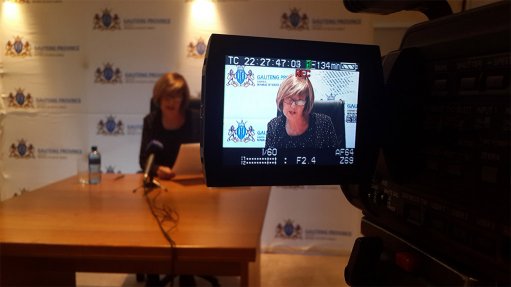
Gauteng Finance MEC Barbara Creecy
The Gauteng provincial government (GPG) will table its ideas for opening its Gauteng Broadband Network (GBN), which is currently being deployed, to the private sector by the end of the year.
Gauteng Finance MEC Barbara Creecy on Tuesday told Engineering News Online that a feasibility study was being undertaken to determine approaches to commercialising the 1 600 km network set to put Gauteng on a “smart” path.
With the private sector increasingly keen to partner with government, and government preferring to take a back seat on becoming service provider-driven, the province was mulling ways of ensuring meaningful private sector participation post the completion of the GBN.
Creecy aimed to, in November, host a workshop to unpack government’s e-governance strategy and outline what services government required of the private sector, while highlighting potential innovation frameworks in a separate parallel session.
This emerged following the close of the inaugural Gauteng Infrastructure Investment Conference last week, where Creecy outlined the progress that had been made in rolling out the GBN to date.
The roll-out of the GBN kicked off this year, with eight nodes already connected to the core fibre-optic high-speed 10 Gb/s transmission network running across Johannesburg, Tshwane, Ekurhuleni, Sedibeng and the West Rand.
The eight core nodes connected included the Telkom Data Centre; 75 Fox street, Imbumba House; Teraco, 82 Grayston drive; Chris Hani Baragwanath Academic Hospital and the West Rand district municipality, as well as the Steve Biko Academic Hospital and the Sedibeng district municipality.
This year, the project would connect 263 access sites across the Gauteng province, with the GPG expecting to link seven township economic zones and pioneer public access to e-government services at 24 Thusong centres in Soweto, Tembisa, Alexandra, Diepsloot, Kagiso, Vosloorus, Sebokeng, Mamelodi and Hammanskraal.
Further, 100 pilot digital schools were being migrated to the network, along with five GPG departments, namely the departments of Economic Development; Sports, Arts, Culture and Recreation; Cooperative Governance and Traditional Affairs; Infrastructure Development and Agriculture and Rural Development.
The province was already noting savings of around R162-million a year as all data, voice and video services were shifted onto the network, slashing the GPG’s telephone bill and improving communication efficiencies.